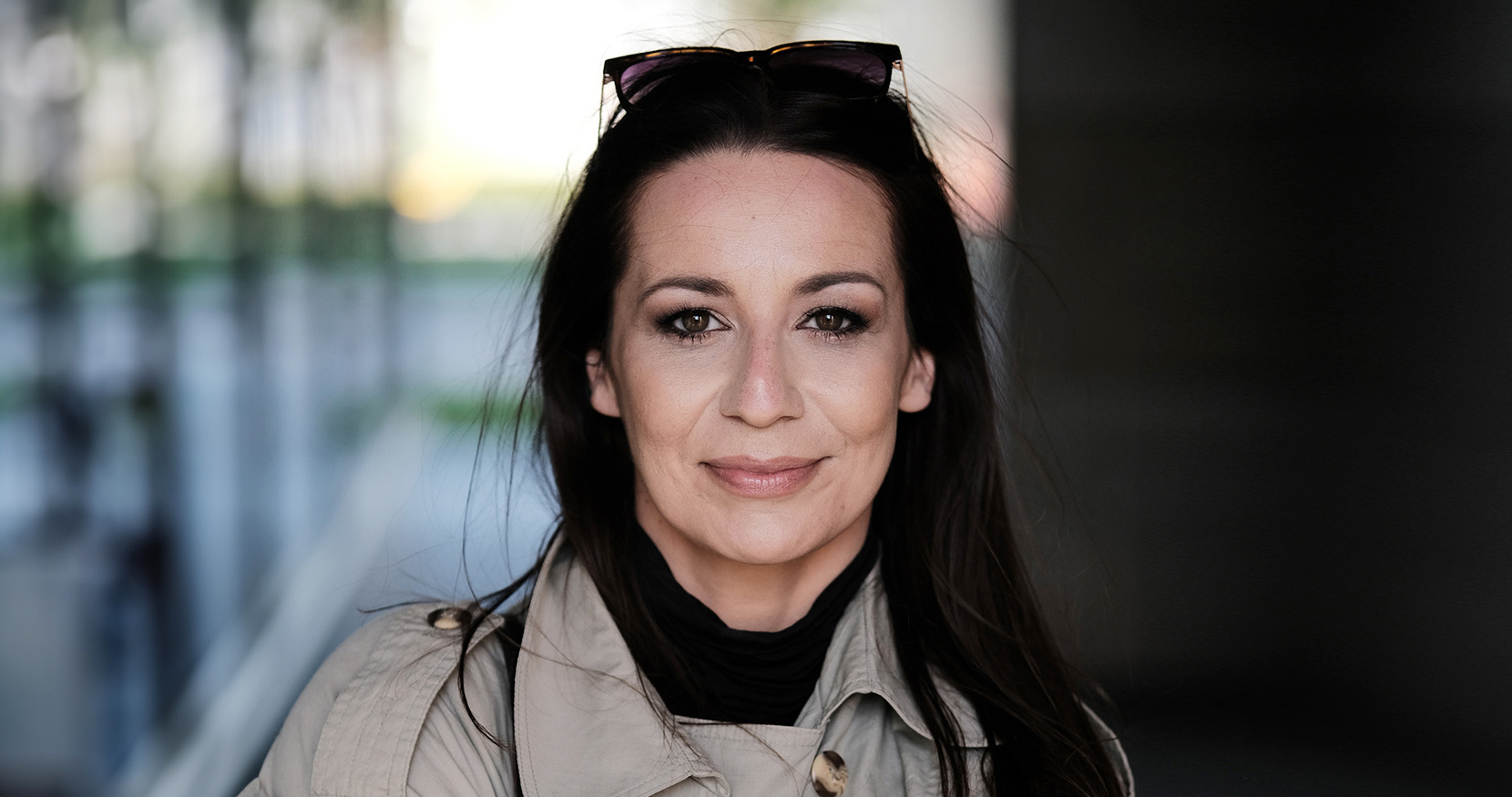
Anna J. Dudek: Mamy być jak matki boskie – idealne, nieskalane, zasuwające, uśmiechnięte, ładne
Klaudia Kierzkowska: Zastanawiam się, czy macierzyństwa trzeba się nauczyć?
Anna J. Dudek: Myślę, że tak. Myślę też, że najlepszymi nauczycielami są dzieci. Nie wiem, czy instynkt macierzyński pojawia się od razu. Wiem natomiast, że Heidi Murkoff, autorka m.in. książki „W oczekiwaniu na dziecko“, twierdzi, że nie, a ma ogromną wiedzę na ten temat. Ja uczę się swojego synka i macierzyństwa codziennie, z drugiej strony – instynktownie go czuję. Myślę, że wiele kobiet tak odczuwa, ale zwykle się nad tym nie zastanawiamy, bo życie toczy się bardzo szybko, a rozmaitych zajęć i obowiązków jest bardzo dużo. Z drugiej strony wydaje mi się, że jesteśmy tak przytłoczone tym, co wydaje nam się, że powinnyśmy czuć – wyobrażeniami i oczekiwaniami innych – że za mało czasu poświęcamy sobie, naszym emocjom, potrzebom i oczekiwaniom.
Macierzyństwo często przedstawiane jest jako najpiękniejsza przygoda życia. Dlaczego tak wiele kobiet boi się mówić głośno o tym, jak to naprawdę wygląda?
Sądzę, że to dla bardzo wielu kobiet jest najpiękniejsza i najtrudniejsza jednocześnie przygoda życia. Polecam lekturę statystyk z jakiegokolwiek obszaru tematycznego dotyczącego macierzyństwa. Ta ponura lektura pokazuje, skąd z jednej strony całe to napięcie związane z potrzebą bycia super mamą, z drugiej – jak dojmujący jest brak wsparcia.
Matki z niepełnosprawnościami i matki dzieci z niepełnosprawnościami nie mają żadnego wsparcia państwa. Muszą – dosłownie – walczyć o życie i godność. Samotne matki? Mamy milion dzieci, które nie dostają należnych im alimentów, a sprawy w sądach są seryjnie umarzane, co zresztą dotyczy także spraw o przemoc. A ofiar przemocy jest w Polsce około miliona, mówię tylko o kobietach, nie o dzieciach. Dalej, żłobki i przedszkola? Tych brakuje. Dostępność lekarzy? Niewystarczająca. Przemoc okołoporodowa? Na szokującym poziomie. Brak dostępu do antykoncepcji, w tym awaryjnej, oraz legalnej aborcji. Trudno czuć radość z tej przygody, kiedy walczy się o przetrwanie.
A obawa, o którą pytasz, wynika, jak sądzę z charakteru społeczeństwa, w którym żyjemy, a które jest głęboko patriarchalne, przypisujące kobietom bardzo określone role. A także ze strachu, że „coś jest ze mną nie tak“. Tylko ze mną. A jeśli powiem o tym głośno, „przyznam się“, ludzie pomyślą, że jestem złą matką. A tak nie chcę być przecież postrzegana.
Wciąż boimy się odstawać od reszty, przy czym mamy mylne wrażenie, że ta reszta ma inaczej. No nie ma. I to jest moje prywatne odkrycie związane z rozmowami i lekturami, którym chciałam się podzielić z innymi kobietami.
To presja otoczenia, „słodkiego” życia przedstawianego w mediach społecznościowych?
Też. Ale i nas samych, pilnujących się, próbujących sprostać oczekiwaniom, próbującym wpasować się w społeczny paradygmat, co w dodatku związane jest z socjalizacją od najwcześniejszych lat. Dla chłopców niebieski, dla dziewczynek różowy, dla chłopców zestaw małego naukowca, dla dziewczynek zestaw do malowania paznokci. Chłopców chwali się, gdy są odważni, dziewczynki – gdy są ładne i uśmiechnięte. Zasadniczo wszyscy dostają pochwały, gdy są „grzeczni“. Nienawidzę tego określenia i nigdy nie używam go w stosunku do dzieci, bo wcale nie uważam, że mają być „grzeczne“. Cieszę się, gdy są sobą, gdy eksplorują, pytają, kwestionują. Cieszę się, gdy mój syn głośno mówi „nie“, gdy stawia granice, gdy pyta „a dlaczego“, choć pewnie łatwiej byłoby, gdyby cieszył się z pochwał za „bycie grzecznym“ (ale takich nie dostaje). Bycie „grzecznym“ przygotowuje ludzi do ślepego podążania za zasadami i braku własnej refleksji, co kończy się – znowu bezrefleksyjnym – wchodzeniem w z góry ustalone role w dorosłym życiu.
Do czego zmierzam – jesteśmy spętane społecznym konwenanasem, presją społeczną, strachem przed ocenianiem i krytyką, która jako matki spotyka nas wciąż i wciąż. Matki mają przechlapane. W tym kraju.

W swojej książce „Znikając” opisuje pani niezwykłe historie. Kobiety podzieliły się z panią swoim życiem, takim prawdziwym. Otwarcie przyznają, jak potrafi być ciężko. Pani zdaniem to akt odwagi?
Myślę, że te historie są do bólu zwykłe i to na tym polega ich siła. Nie chciałabym myśleć, że to odwaga, bo odwagą nie powinno być mówienie o normalności, o codzienności, o zmęczeniu, strachu i czasem zdziwieniu, że nie tak miało być. Myślę, że moimi rozmówczyniami kierowała chęć przerwania zmowy milczenia, że to wynik złości na to tabu i rzeczywistość, zarówno społeczną, jak i polityczną, a przez to także rodzinną, która jest po prostu bardzo trudna. Bywa piękna, ładna, rozczulająca, ale też trudna.
Dlaczego wciąż tak wiele kobiet boi się, przyznać, że są chwile zwątpienia, momenty, w których chciałybyśmy po prostu uciec?
Bo jesteśmy kołtunami, którzy przyzwyczaili się do nadzwyczajnego poziomu zakłamania i hipokryzji, co szczególnie dotyka kobiety, które są od stuleci na cenzurowanym. Nasze życia są prześwietlane, nasze ciała traktowane, jakby należały do wszystkich, nasze potrzeby ignorowane.
Mamy być jak matki boskie – idealne, nieskalane, zasuwające, uśmiechnięte, ładne. A wszystko to wynik głęboko patriarchalnego systemu, który zakłada nam gorsety i kagańce.
Kobieta, która ma dość swojego dziecka, na pewno zostanie uznana za psychopatkę?
Kocham mojego syna nad życie. Najlepsze, co się wydarzyło w moim życiu, to jego narodziny. Każdego dnia patrzę na niego i nie mogę uwierzyć, że ta doskonałość to moje dziecko. I każdego dnia jestem potwornie zmęczona. Często myślę, że jeśli usłyszę jeszcze jedno, dwusetne „mamooo“, albo znowu uchylają się drzwi łazienki, bo Gutek bardzo się stęsknił, kiedy akurat sikałam, albo kiedy odbywa się wieczorny rytuał spania w cyklu „czytanie, rozmawianie, przytulanie, prawie spanie, szklanka wody, trzecie siku, a jeszcze to i tamto“, to eksploduję. Mam dość, czuję za dużo bodźców, chcę przez chwilę zatrzymać się i odetchnąć, pobyć sama. Jestem psychopatką? Nie, jestem kochającą mamą, która, jak piszę, „pada na ryj“ i potrzebuje przestrzeni dla siebie. Są nas miliony.
Mam wrażenie, że współczesne matki stawiają siebie na ostatnim miejscu. Przejmujemy się wszystkimi dookoła, ale nie sobą. Dlaczego?
Bo świat nas nie kocha, tylko eksploatuje, a my zasuwamy jak chomiki w tych obrotowych klatkach. To stawianie na piedestale jest pozorne, komplementy złudne, a realnej pomocy nie ma właściwie na żadnym poziomie. Wszystko albo nie działa wcale, albo nie tak, jak powinno.
Jesteśmy zmęczone, bo macierzyństwo w Polsce jest sportem ekstremalnym.

Co matka może i powinna zarobić dla siebie?
To jest jak w znanej opowieści o masce tlenowej. W nagłej sytuacji w samolocie najpierw zakładasz ją sobie, potem dziecku czy innym osobom, bo raczej nie pomożesz nikomu, kiedy sama się dusisz. Tak samo jest w życiu, ale ponieważ to nie jest żadna „nagła“ sytuacja – mówię o codzienności – zapominamy o tym i zasuwamy ponad siły, ogarniając i obsługując wszystkich dookoła, bo przecież cała praca opiekuńcza (tzw. reprodukcyjna) spoczywa na barkach kobiet. Tego wszyscy od nas oczekują, a my to po prostu robimy. Tylko energii coraz mniej.
Dlatego przede wszystkim musimy założyć te maski tlenowe sobie. Próbować nie mieć wyrzutów sumienia, kiedy robimy coś dla siebie, bo to po prostu podstawowa higiena psychiczna, która w dodatku wszystkim się opłaca.
Niesamowite jest to, że te zmęczone, wyczerpane macierzyństwem kobiety, są tak naprawdę w głębi serca szczęśliwe.
Śmiała teza. Nie wiem, czy są szczęśliwe, wiem, że szczęśliwe czasem bywają. Ponoć najszczęśliwsze i najbardziej zadowolone z życia są kobiety, które nie są z nikim związane i nie mają dzieci. „Moje“ matki mają poczucie obowiązku i zwykle niewyobrażalne pokłady miłości, ale nie jestem pewna, czy określiłyby się jako „szczęśliwe“. Niektóre pewnie tak, inne by to zadeklarowały, choć to nieprawda, inne jeszcze zwyczajnie szczęśliwe nie są. Inne pytanie brzmi: co to jest to szczęście? Czy to, że budzę się obok mojego niepełnosprawnego dziecka i czuję, że ono oddycha, czy może kiedy jako niewidomej matce znowu bezpiecznie udaje się przejść z dzieckiem przez ulicę? Albo kiedy alimenty spływają na czas i nie muszę się martwić, skąd wziąć pieniądze? A może kiedy po latach walki udało mi się w końcu zostać mamą? Definicji jest tyle, ile sytuacji. Nie lubię dużych kwantyfikatorów, nie powiem więc, że dotyczy to „wszystkich“ albo „żadnej“.
Zastanawiam się, czy macierzyństwo jest poświęceniem?
Według mnie – tak. Zarówno fizycznie, jak psychicznie. Odwołam się do Rachel Cusk, która w swojej książce „Macierzyństwo, praca na całe życie“ opisuje ciążę jako wrażenie porwania przez obcych. Myślę, że to potem może się rozciągać na wiele obszarów życia i znowu – taka refleksja wynika z rozmów z bardzo wieloma kobietami. Kobiety mają poczucie, jakby ktoś im zabrał tożsamość, je same. To dotyczy głównie początków macierzyństwa, ale w wielu przypadkach trwa, zwłaszcza, jeśli dochodzą rozmaite wyzwania związane ze zdrowiem, edukacją czy finansami. A tych nie brakuje.
Kobieta żyjąca w Polsce nie ma łatwego życia. Dlaczego państwo zawodzi kobiety, ciężarne, matki?
Wbrew deklaracjom kobiety nigdy nie były cenione, raczej traktowane jak siła robocza i rozrodcza. W Polsce od ośmiu lat mamy rządy fundamentalistów, którzy kobiet nienawidzą, a myślę, że wynika to z tego, że się ich boją.
Ostatnie wydarzenia pokazały – mam na myśli sprawę Joanny z Krakowa, śmierć Izabeli z Pszczyny i innych kobiet – że ta władza kobiet nienawidzi. W tym: matek.
Co skłoniło panią do napisania tak szczerej i niezwykle autentycznej książki?
Macierzyństwo. Tylko tyle i aż tyle, z naciskiem na aż.

Okładka książki „Znikając. Reportaże o matkach“ /fot. materiały prasowe
Anna J.Dudek – dziennikarka i redaktorka od lat związana z „Wysokimi Obcasami“. Publikowała m.in w „Polska The Times“, „Oko.Press“, „Fakcie“. Pisze głównie o prawach kobiet w kontekście politycznym i społecznym. Autorka „Poddaję się. Reportaże o polskich muzułmankach” oraz „Dolce vita po polsku”







































